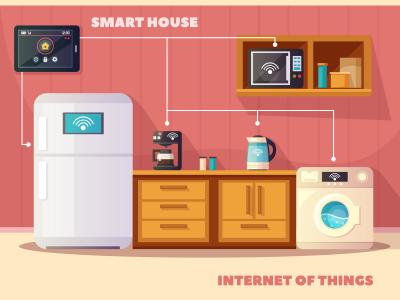
The Pros and Cons of Smart Kitchen and Laundry Appliances
When new technology hits the market, are you the first in line to buy it? Some people have a penchant for the latest bells and whistles, while others are more comfortable taking a wait-and-see approach.
What about smart appliances for your kitchen and laundry areas? Some homeowners are enamored with the thought of adding these devices to their internet-connected home. Others aren’t convinced they’re ready to spend big bucks for features they may not use.
If you’re thinking about going “smart,” consider these advantages and disadvantages.
4 Advantages
- Smart appliances can cut your electric bill. Some equipment can calculate energy rates and schedule high-energy-use activities for low-energy-cost times of the day. For example, loads of laundry can be run when electricity rates are lowest, and integrated sensors can optimize drying times.
- They look cool. The cutting-edge appearance of these appliances, including backlit touch screens, is particularly attractive to tech-loving homeowners and those with modern decorating motifs.
- Great laundry features. Smart washers and dryers may not be able to sort, fold, and hang your laundry. They do, however, offer other attractive attributes, like notifying you when loads are complete. Smart washing machines can tell you if you’re running low on detergent and even order more online. Smart dryers can let you know when the vent needs to be cleaned, to avoid fire hazards from lint clogs.
- Kitchens too. New flexible refrigerators can change cooling sections from refrigeration to freezing and back again, depending on your changing needs. Find a sale on ice cream, but your freezer is full? No problem! You can also see what’s currently in your fridge while shopping. Or, do you want your stove to defrost and cook dinner and keep it warm until you arrive home? It’s possible.
4 Disadvantages
- Smart appliances cost more. In addition to higher purchase prices, they often require more repairs than mechanical versions of the same machines. According to Angie’s List, those repairs can be 50 to 100 percent more expensive.
- They may pose data and privacy risks. Smart home appliances may not utilize reliable internet security protocols, giving hackers a pathway to access other connected devices in your home. Also, the more data that these devices are collecting about you, your habits, and your home, the more that data could be vulnerable.
- Firmware issues. Manufacturers may not provide timely firmware updates, which means an appliance may no longer integrate with other devices, like a smart home hub and voice-activated controllers. It’s also easier for hackers to access devices that aren’t kept up-to-date and secure.
- No connection = dumb appliances. If your smart appliances can’t connect to the internet, they are no longer “smart.” Before buying, be sure to check reviews for individual products as well as the manufacturer’s customer service ratings.
To Buy or Not To Buy
Maintenance and repair costs can add up to more than your energy savings. What is the most common point of failure? The computer controller board, according to appliance repair professionals.
Before purchasing, ask yourself what features you will use. For example, is it worth paying a premium for the convenience of asking your refrigerator, via text, if you’re out of milk?
If you want smart appliances without substantial sticker shock, hold off a bit longer. According to a recent forecast by Juniper Research, the average cost of connected home appliances are expected to drop by 52 percent between 2018 and 2023.
If you are a technology lover, it may be worth every cent to have your home fully connected to the internet. If you just want your major appliances to do their job, smart kitchen and laundry equipment may not be your best choice… yet.
